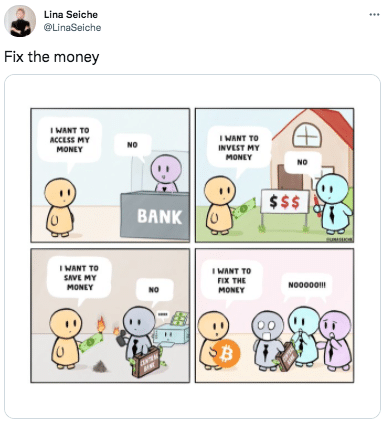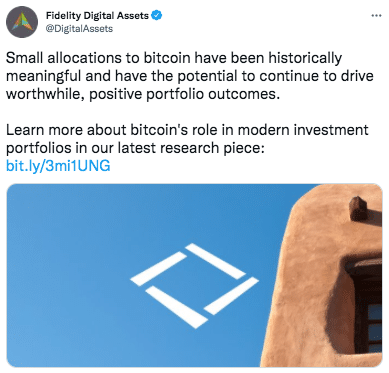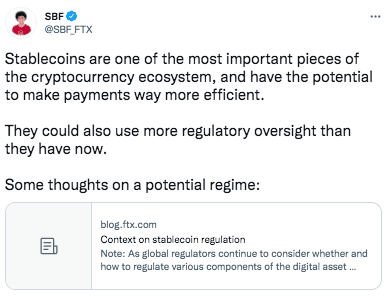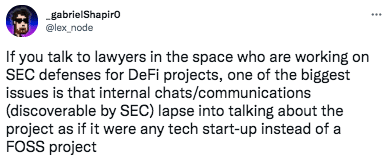October 27, 2021 / Unchained Daily / Laura Shin
Daily Bits ✍️✍️✍️
-
Robinhood crypto revenue declined 78% in Q3.
-
Tesla has not ruled out accepting Bitcoin as payment again.
-
GameStop is hiring an Ethereum specialist for its “Head of Web3 Gaming” role.
-
Uniswap passed $500 billion in total trading volume.
-
Citi set its price target for Coinbase at $415, calling it a “buy.”
-
Tether announced a trial partnership with Notabene to help combat money laundering.
-
Ampleforth is launching on Avalanche.
-
Helium, a crypto startup building a user-run wireless network, is partnering with FreedomFi and Dish Network to facilitate 5G nodes.
-
With its latest $100 million funding round, CoinList is now valued at $1.5 billion.
-
Gemini, the Winklevoss-led crypto exchange, rented a billboard on 57th Street in New York to honor the Bitcoin white paper’s 13th anniversary on Saturday.
-
Valkyrie filed to offer a leveraged BTC futures ETF.
-
Abracadabra is bringing high-yield stablecoin farming to Ethereum.
-
Anthony Scaramucci’s SkyBridge Capital is privately offering investors the chance to invest in Kraken, the cryptocurrency exchange that plans to go public next year.
-
The Graph is expanding to the NEAR blockchain.
-
FTX will air a commercial during the Super Bowl.
-
Adobe now has a feature that enables users to publish images as NFTs and allows people to see attribution for the creator of the NFT and who minted it
Correction from yesterday’s edition of Unchained Daily:
The Korea Teacher’s Credit Union has denied reports that it has plans to invest in Bitcoin.
What Do You Meme?
What’s Poppin’?
Jelena McWilliams, chair of the Federal Deposit Insurance Corporation (FDIC), spoke at the Money 20/20 conference in Las Vegas, where she expounded upon the FDIC’s role in crypto regulation.
McWilliams’ stated that her job is to provide “clear guidance” to the public on how crypto assets are to be policed. According to her speech, the FDIC plans to release a series of policy statements in the coming months.
McWilliams believes that allowing crypto innovation to flourish “while mitigating risks” is essential. “If we fail to do this, we risk stifling innovation and forfeiting America’s leadership in developing world-changing technologies,” she explained.
In addition to speaking on the FDIC’s plan to clarify crypto policy, McWilliams touched on the benefits and risks of stablecoins.
Benefits: “Stablecoins can offer many potential benefits… a faster, cheaper, more efficient mechanism for making payments than legacy systems… programmable” payments that happens automatically based on the occurrence of a specified event, which could lead to better management of debt repayment.”
Risks: “Stablecoins also present certain risks, specifically if one or more were to become a dominant form of payment in the United States or globally. This could lead to substantial sums of money migrating out of insured banks with significant ramifications for credit creation, financial stability, and bank funding.”
McWilliams thinks stablecoins should be subject to “well-tailored government oversight” to ensure that stablecoins issued outside the banking sector are truly backed 1:1 by safe assets.
After the Money 20/20 talk, the FDIC chair also hinted that regulators are looking into how banks might hold crypto assets in a conversation with Reuters.
“At some point in time, we’re going to tackle how and under what circumstances banks can hold them on their balance sheet,” McWilliams told Reuters.
Recommended Reads
- Fidelity on Bitcoin’s role in the modern investment portfolio:
- FTX on stablecoin regulation:
- Gabriel Shapiro, general counsel at Delphi Labs, on why DeFi projects should differentiate themselves from tech start-ups:
On The Pod…
Not Reporting Info on Some Transaction Partners Could Soon Be a Felony
Remember the $1 trillion infrastructure bill, which caused considerable backlash from the crypto community due to the language regarding “brokers?” Abe Sutherland, an adjunct professor at University of Virginia School of Law, believes another provision tucked inside the bill could end up being a far more significant issue for anyone transacting in digital assets. Show highlights:
-
how Abe fell down the crypto rabbit hole
-
what provision 6050I is and how it could affect anyone transacting with digital assets
-
how 6050I works and when it would apply
-
why violating 6050I would be a felony
-
how 6050I discourages digital asset transactions
-
how 6050I would apply to different transaction types, like peer-to-peer trades, NFT sales, and smart contract escrow accounts
-
what information recipients of digital assets must verify from the sender
-
how the government came up with the $10,000 reporting threshold and why Abe believes this number is outdated
-
why Abe thinks proposing 6050I within the infrastructure bill is inappropriate
-
what reasons the government has to want to put such stringent reporting requirements on digital asset transactions
-
how 6050I fits under the financial laws of the Bank Secrecy Act
-
why Abe believes the amendment should be struck from the infrastructure bill
-
what Abe thinks of the constitutionality of 6050I
-
how Abe views 6050I as less about generating tax revenue and more about tracking people’s digital asset transactions
-
what action steps he says the crypto community can take to fix the bill
Book Update
My book, The Cryptopians: Idealism, Greed, Lies, and the Making of the First Big Cryptocurrency Craze, is now available for pre-order now.
The book, which is all about Ethereum and the 2017 ICO mania, comes out Jan. 18. Pre-order it today!
You can purchase it here: http://bit.ly/cryptopians







